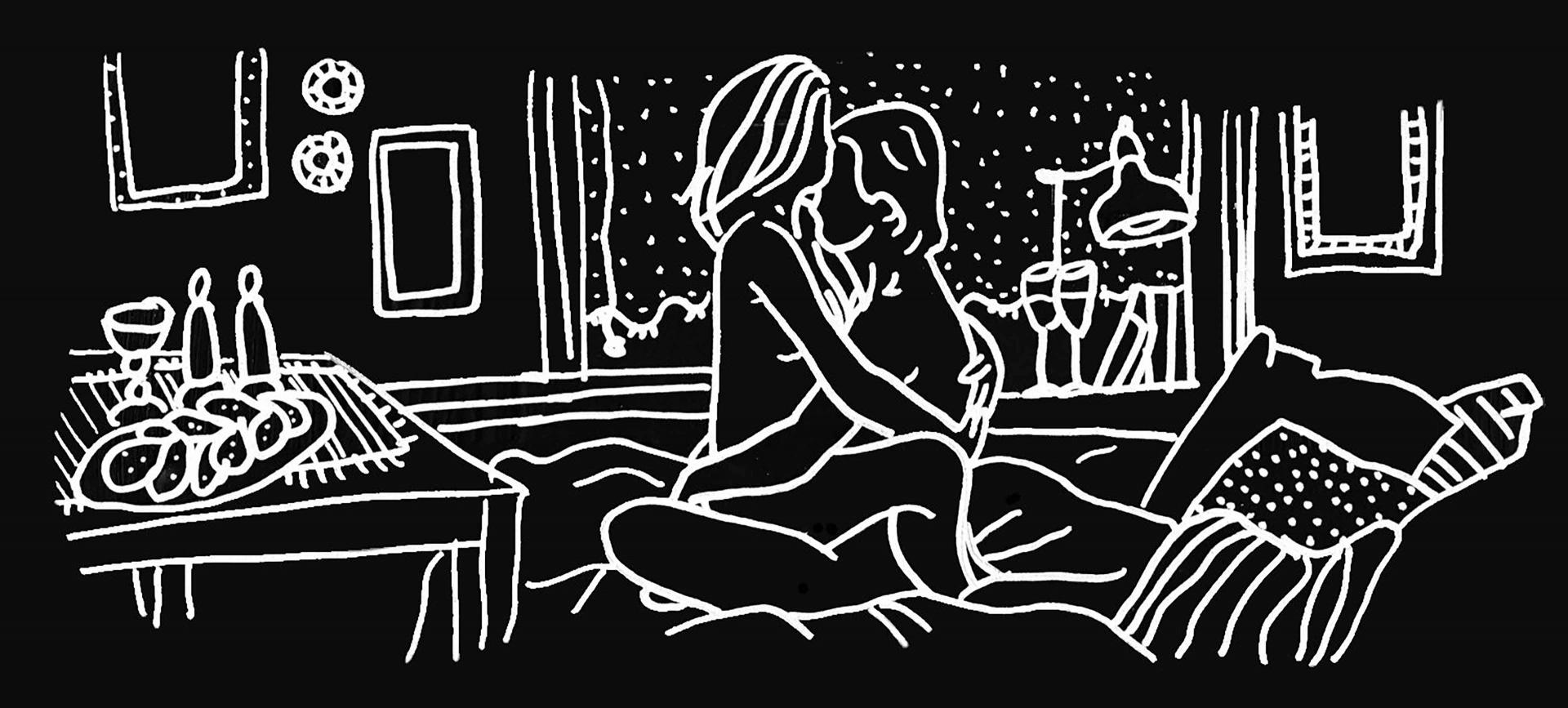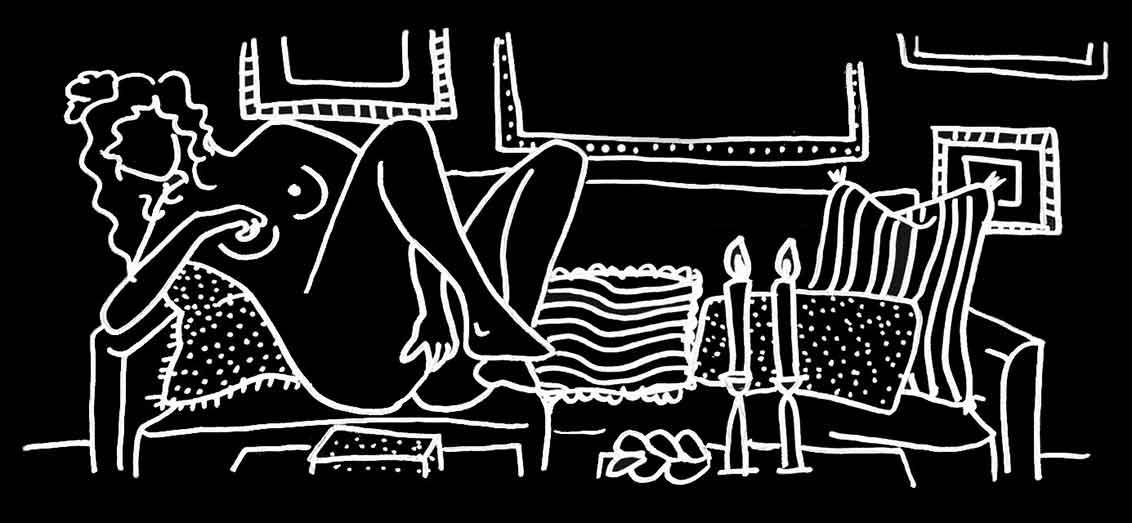“Sex Is a Force”
Interview with Talli Rosenbaum

Challah Back Girl, from the series Shabbat Sex Positions to Get Your Double Mitzvah On, Melissa Cetlin, a special project for At The Well, 2017
Talli Yehuda Rosenbaum is an individual and couples therapist as well as a certified sex therapist and supervisor in Israel. Her research addresses the psychosocial and cultural aspects of sexuality and relationships as well as the intersection of trauma with intimacy and sexuality. In the podcast Intimate Judaism, Talli Rosenbaum and Rabbi Scott Kahn explore a wide range of questions around lived sexuality in harmony with the Torah and halakhah.
Talli, you are a certified sex and relationship therapist working with practicing Jews who, to varying degrees, are living their lives according to Jewish law. How would you say this impacts on their sexuality, on their sex lives, on their inner worlds in relation to sexuality?
In Orthodox society, the expectation is that you transition from a sex-free upbringing to becoming sexually active from your wedding night on. Couples who have difficulty consummating their marriage on their wedding night or thereafter may seek sexual counseling. What I noted from my clinical practice working with newly married women and couples was a very, very high level of anxiety—individual anxiety, family anxiety, societal anxiety—about this idea of consummating the act. What really began to break my heart was the experiences of women with sexual pain or vaginismus, a condition where the body tightens due to fear of intercourse. In my first career as a pelvic floor physical therapist, I saw women who were traumatized and who were dissociating. They would actually say, “Look, I need to be able to have sex. I need to be able to, but it hurts me and I need it not to hurt, so do what you have to do, don’t mind me. I don’t need to have pleasure, I just need for it not to hurt so that I can perform this act of service.” It was clear that if they didn’t have sex, there would be these very anxiety-driven repercussions. These experiences were what drew me to the mental health field.
What sort of communities or individuals do you work with?
I would say that the large majority, probably 95 percent, of the individuals and the couples I work with really are on the spectrum of Orthodoxy. That could be anywhere from open Orthodox, modern liberal, to very, very Haredi and Hasidic.
The title of our exhibition is Sex: Jewish Positions. If you had to distill Jewish values into key stances or ethics, what would you say they would be?
That’s a broad question! I think we first have to look at the meaning of sexuality in Judaism—I don’t think there’s any monolithic position. The Talmud is replete with stories of Tanna’im and Amora’im who were confronted with sexual temptation and lust; the Jewish texts talk about sex in terms of a temptation or a force, a yetzer, that needs to be confronted and needs to be regulated.
In terms of how Judaism views sexuality, there’s more than one stance. Some rabbinic sources seek to minimize the experience of sexual pleasure and indicate that asceticism is a preferred template. There might be minimal conversation about it, and that might be very technical. Conversely, there are sources, steeped in mystical Judaism, that glorify marital sexual pleasure and satisfaction, considering sex to be a divine gift and holy obligation.
Another view would be the Rambam, the Maimonides approach, which is more practical and focuses on moderation. Rather than glorifying or vilifying sex, this approach recognizes that Jews have sex, just as all humans do, and engage in marital sex for pleasure as well as procreation.
All in all, Judaism embraces the attitude that sex is a good thing, as long as it’s in the context of marriage between a man and a woman. So the limitations and restrictions around sex aren’t so much about the act of sex itself, but about the context in which it is experienced. When it comes to ethics, the ancient texts provide rules around sex that were consistent with the ethics, morals, and values of the day. But while the Torah is pretty set, society is not, and we as Jews need to be dynamic enough in our appreciation of contemporary ethics that we can continue to embrace them as we integrate them with the values of Torah.

The Easy Rester, from the series Shabbat Sex Positions to Get Your Double Mitzvah, Melissa Cetlin, a special project for At The Well, 2017
Do you feel that there’s a recognizable Jewish sexuality shaped by these values, whether they’re coming from the halakhic literature or from cultural norms?
There are some different directions to go, answering that. I think the Talmudic stories about sexual temptation and lust really do teach us and indicate that the confrontation with sexuality, with human sexual development, is part of being human. It’s part of being alive. The idea of a sexual self that is highly regulated and that interacts within the framework of what is halakhically allowed is probably considered the ideal. But these Talmudic stories also indicate to us that it is an ongoing struggle and that it’s meant to be an ongoing struggle. For example, if we take masturbation—which is halakhically forbidden—as a human developmental reality, we will realize that there is an existential conflict in the framework of observant Judaism. The way this can affect a person is very individual.
I can’t give a global perspective on the type of conflict that every young man or young woman is going to experience. But for some young men, this could create the beginning of a move away from Orthodox Judaism: if there’s a law that I’m unable to keep, then maybe this is not for me. A different approach to the conflict is the splitting kind, where the sexual part of me is a part of me that I don’t own. As a result, however, I end up being confronted with shame—which then, again, I will need to heal. With a healthy sense of development, there might be a healthier approach to integrating parts of me that are too difficult. That could be admitting I’m not able to follow a law 100 percent, just like I don’t 100 percent follow the laws of guarding my tongue and not saying lashon ha-ra. Saying that I give myself permission to struggle, I forgive myself for the struggle. Part of therapy work would be teasing that out and seeing how it shows up within your sense of self.
You co-host the podcast Intimate Judaism and have written a lot on the intersection of sexuality and halakhah in the context of very twenty-first-century concerns, new sensibilities around mental health, and emotional well-being. Do you see some shifts happening in the last couple of years? There are lots of laws that may be tricky for people to keep if, as well as being Orthodox, they have a feminist sensibility, or for example marry much later.
Absolutely! And yet we still have a long way to go in terms of the integration of sexual education, contemporary ethics, and values with the teachings of Torah and halakhah. One example is consent. Consent is an important concept in negotiating sexuality, yet there is little direct discussion in the sources of the need to acquire mutual consent. When I questioned this, I was told that consent is implied in the sources, but in my opinion the idea of consent could definitely be spoken about much more. When sex is talked about, the language suggests you may do what you want with your wife—as long as you don’t spill seed. But there isn’t a very clear discussion of “as long as she allows it, as long as she wants it, as long as she desires it.” Being able to add that into sex education, even as we talk about values, is important. So, for example, if Orthodox young people are taught the laws of shmirat negiah—which means not engaging in any kind of premarital touch—and there’s no additional conversation about consent, about boundaries, about desire, about pleasure, then what? Then after marriage, anything goes? And what about consent and boundaries if shmirat negiah is not being observed?
Fortunately, the discourse around sex in the Orthodox world has become more open than in the past. I was involved in the first published study on the experience of married Orthodox women and their sexuality, which appeared in 2007. We did a survey of close to four hundred women and asked them many questions about their sexuality, their sexual function, things they wish they had known going into marriage.1 These women reported not having received basic information about sexual pleasure, basic information about their anatomy, or about what was supposed to happen on their wedding night. They certainly didn’t have a sense of being entitled to consent or not consent.
When I see what’s going on in the modern Orthodox world today in terms of sexual education for premarital instructors, I find more discussion about consent. The Eden Center in Israel provides trauma-informed premarital education courses. Yoatzot halakhah, female halakhic authorities in this area, report that they regularly receive questions such as “What if I don’t want to have sex on my wedding night or on mikvah night?” There are more written materials, more books, and more blog posts. There’s a great deal more exposure on social media, with Facebook groups and Instagram influencers talking about sex and intimacy in the Orthodox world. I see all this as a very, very positive move forward.
The veteran Orthodox sex therapist Dr. David Ribner and I cowrote the book I Am for My Beloved: A Guide to Enhanced Intimacy for Married Couples.2 While this book is written with sensitivity to Orthodox couples, it includes pictures of genital anatomy and different sexual positions, and discussions of sexual positions; we also discuss pornography and infidelity. I think it’s really one of the first resources on intimacy and sexuality of its kind for Orthodox people.
It is! You spoke of the premarital teachers: what role do the hatan and kallah teachers play in all of this?
For many young Orthodox people and certainly in the more ultra-Orthodox societies, their first official discussion around sex will be in preparation for marriage. There’s a great deal of diversity in how this sexual education is provided: there’s no standardization. I would put a word in for the Eden Center that I mentioned earlier. It is an organization founded by Dr. Naomi Marmon Grumet, who has done a tremendous amount in Israel in terms of preparing women, preparing instructors to be very informed about sexuality and to give the right information, the proper information. She has done some research on the kind of societal messages that young men and young women get around sex in modern Orthodox or Zionist Orthodox communities. What she found was that for young women, there is very little sense of sexuality being acknowledged in their development: sexuality is basically about dressing and behaving modestly, taking care not to arouse the desire of men.
For young men, it is different. Sexuality is acknowledged and sexual thoughts and feelings are validated. Young men are told, “We know you struggle with it. But when you get married, then you will have a way to channel your sexuality.” And this message, as true as it might sound, can also be very damaging. It sets up an expectation, so that many young men believe, “My salvation is going to be my wife; and all of these fantasies and desires that I’ve sat on, I can now play out.” Again, if this isn’t coupled or integrated with ideas of mutuality, of consent, of communication, of what feels good for you and what feels good for me—how do we even talk about this before we get married? What are our concerns and how do we want to navigate the commencement of our intimate life? Or how do we want to continue the intimate life that we began beforehand? How do we want to navigate observance of the laws? When it comes to talking about these questions openly, the ultra-Orthodox and the Haredi, the more Hasidic societies are not quite there yet. And so, because secular messages filter in, especially nowadays, it’s not unusual to have Haredi young women come in and say, “I didn’t want to have sex on my wedding night. I hardly knew my husband. I am just an object for his needs.” This awareness didn’t come in from within the system—it came in from the outside. So as Western messages permeate through into Haredi societies, they, too, need to acculturate this idea. Similarly, for men, the commencement of sexual engagement can be fraught with anxiety. Men often feel as if they are the ones who have to know everything. They’re in charge. And it can be very, very difficult for them.
Considering the laws of familiy purity: how do you feel they impact on intimacy, for both the woman and the man?
We all grew up hearing from our teachers that taharat ha-mishpahah is the way to ensure a sexually satisfying, intimate life. We were taught that if you keep these laws, they will be what will keep things fresh, because the monthly renewal makes you feel you’re looking forward to it all over again. Because my colleagues and I were seeing quite a bit of sexual dysfunction in our Orthodox couples, we started to question this. The fact that some couples choose to modify the way they practice taharat ha-mishpahah may actually impact on their sexual life, and it may do so in positive ways, in the sense that it restores some sense of autonomy. But it may also create conflict, if each member of a couple has a different approach to how much they want to keep or not keep the laws. In general, I think a lot of the teaching we find today has a far more honest approach, when teachers will tell their couples or their clients: “It’s not easy.” And it’s not.
But the family purity laws are just one example; premarital touch, premarital sex is another. And then certainly there’s the whole issue of LGBTQ+ and being oriented in a way that’s not in the sources, not approved, or not considered to be a real marriage. Men don’t marry men in the Torah. Nor do women marry women. There’s no template for that. And this often leads to identity crisis: How do I navigate with respect to my Jewish identity, my halakhic identity, my religious identity with my sexual identity, whom I’m attracted to, whom I love? That would be another example of an area which maybe even twenty years ago wasn’t discussed in society; today there are several organizations that deal with it.

The Shekinah, from the series Shabbat Sex Positions to Get Your Double Mitzvah On, Melissa Cetlin, a special project for At The Well, 2017
When it comes to LGBTQ+ issues, it seems that certain rabbis, particularly in the modern Orthodox world, have made progress. Are there other areas where the worlds of therapy and mental health are convincing rabbis to work with more leniency?
Absolutely! And in many different areas, not just in sexuality. In most rabbinical programs today, rabbis as well as female rabbinic authorities are learning a lot about mental health. In Judaism, there is the concept pikuach nefesh, which means that there do need to be halakhic leniencies when there is a threat to life. For example, that’s certainly true with fasting for somebody who has an eating disorder. So now, there’s a recognition that there is an inherent kind of conflict between halakhah and people who are LGBTQ+, regarding their mental health. In order to provide empathy and prevent depression or—God forbid—suicides, there needs to be a lot more movement towards inclusion. However, in the world of LGBTQ+, there’s a great desire for acceptance beyond just taking it into account: LGBTQ+ is not a pathology, and LGBTQ+ people do not want to be seen as having mental health issues when it comes to their identities. But I do think we need to recognize that if they are religious, if they are Orthodox, if they are Haredi, they are going to have conflicts.
We have a podcast episode with Rabbi Benny Lau, speaking about lo tov hayot ha-adam levado—the concept that “it’s not good for man to be alone.” If you are a homosexual, then you should live with a man. And within the community, we don’t ask you what you do in your bedroom, no matter whether you are heterosexual or homosexual. The Torah doesn’t say you’re not allowed to be a homosexual; the Torah states a certain prohibition against a certain specific act. That seems to be a more modern approach.

The Digital Detox, from the series Shabbat Sex Positions to Get Your Double Mitzvah On, Melissa Cetlin, a special project for At The Well, 2017
In the exhibition, we look at taboos and fantasies in relation to sexuality. Do you have observations on how our fantasies are shaped by our religious and cultural backgrounds?
This would have to be studied! I think the issue of fantasy is very human, not Jewish, not religious. I wouldn’t necessarily say we can draw conclusions from a few anecdotal stories, but what I have found with some of the ultra-Orthodox women I have spoken to is that they talked about fantasies of domination, particularly when their reality is about feeling oppressed. People who are very inhibited by religious and cultural messages around sex may struggle very much with the content of their fantasies; the idea of controlling our sexuality can become almost oppressive. I think part of the message has to be that we can control our behaviors, but that our sexuality is very complex, and not every thought or desire that comes into our mind necessarily means that there’s something wrong with us or even that we actually want to partake in this fantasy. There aren’t really a lot of permissive cultural messages about fantasy. The idea of being very focused on your partner, being intentional, is a beautiful mindfulness principle and can certainly create incredibly focused, intentional sexual experiences with your partner. But they can’t always be like that. And sometimes people just fantasize. These are mechanisms our brain uses, and being able to feel some sort of sense of permission could be therapeutically helpful for many individuals. In a fantasy, you can be anyone, do anything, and not get punished; there’s definitely a role for fantasy.
The #MeToo movement has had an immeasurable impact on contemporary culture and sexual politics. Has it made an impression in the Orthodox world?
Yes, I think it has had quite an impact! Because many women have had sexual experiences for which they feel a lot of shame and guilt and for which they blame themselves. Part of that blame comes from messages from society: if you drank or if you dressed a certain way or if you acted a certain way—what were you doing out with him that late at night? I think one thing the #MeToo movement might have done is help heal some of that shame. And it also helped to explain the freeze response, so that on a global level women and men go to therapy for trauma and finally understand why they didn’t scream and cry.
The second thing is that the discussion of consent has begun to trickle in, and the idea that it’s not okay to coerce or to take advantage. I think that in the past, young religious women who were sexually active would tell themselves, “You shouldn’t be doing this stuff, you shouldn’t break shomer in the first place—so if you do, you don’t have the privilege or the right to consent or not.” I think you need to be empowered to make your own decisions and then make your own decisions about boundaries and consent.
I have one last question on which I’m curious to hear your thoughts. A friend of mine once said that if you ask New Yorkers to close their eyes and imagine a sex therapist, they picture a Jewish woman. Going back to Hirschfeld and Freud, through to Dr. Ruth and Esther Perel—is there a particularly Jewish interest in this area, and if so, do you have a sense of why that might be?
I think, essentially, Jews do not play into the Catholic or Puritan value system. I would like to say that Judaism is essentially sex positive, even if it is limited to sanctifying sex within marriage. There’s never this feeling that sex itself is wrong or bad or evil. It’s a force. The Jewish values around it are more about regulation and sanctity, but sex is meant to be playful, pleasurable, and connecting, and is considered to be important in building and maintaining intimacy and marital harmony.
The interview was conducted by curator Joanne Rosenthal.

Sex: Jewish Positions: Features & Programme
- Exhibition Webpage
- Sex: Jewish Positions: Exhibition, 17 May to 6 Oct 2024
- Publications
- Sex. Jüdische Positionen: Catalog accompanying the exhibition, German edition, 2024
- Sex: Jewish Positions: Catalog accompanying the exhibition, English edition, 2024
- Digital Content
- Letʼs Talk About Sex: Online feature accompanying the exhibition
- What do the artists say? Interview series accompanying the exhibition
- Listen to the exhibition’s soundtrack: Playlist on Spotify
- The Song of Songs. Between Literal and Allegorical Loves: Essay by Ilana Pardes
- “Sex Is A Force:” Interview with Talli Rosenbaum
- Androgynous Characters in I.B. Singer’s Literary Shtetl: Essay by Helena Lutz
- Jewish Places: Find information about Jewish sites related to the exhibition on our interactive map



